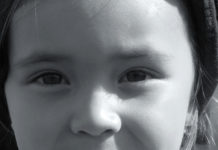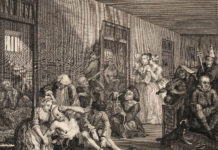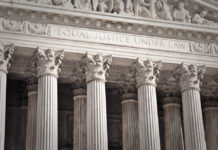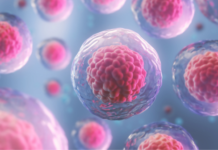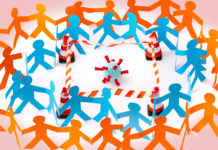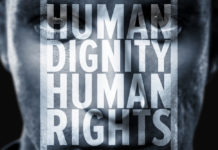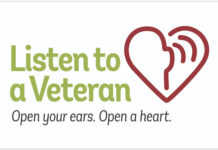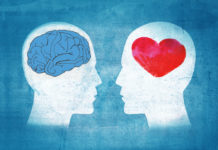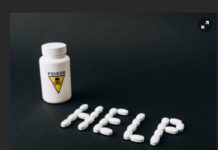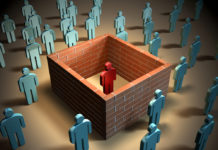We Are All in This Together
We need a new narrative of shared distress to replace the failed one of individual disorders. We need human connection and mutual support. We can learn to manage our feelings in a way that helps us through the crisis and gives us the energy to make much-needed social and environmental changes afterwards. The usual dividing lines melt away in the face of global emergency. We really are all in this together.
Antidepressant Use Continues to Climb Among Youth on Medicaid
New study finds that Medicaid enrolled youth were 14 times more likely to be on an antidepressant in 2014 than in 1987.
A Peek Inside the Modern Asylum
The psychiatric hospital of today is a panopticon, a modern prison for the daring mind and for weird behavior. I was once inside and thus, am inviting you to have a look. I will take your hand, and encourage you to join me, on an exploration of the inside of the psychiatric institution. We'll have a small peek, but in reality, it is much more distressing for the one who is being observed.
Social Determinants of Health and the Continued Individualization of Suffering
We need to stop believing that suffering people are genetically inferior or “diseased.” You, as sufferer, are not alone in having social determinants of health. They are universal. They are systemic. And they are not solvable or “addressable” at the individual level. The only way to alleviate negative social determinants of health is to create a more equitable, inclusive, and just society.
Supreme Court Decides Case on Insanity Defense
The debate between the majority and dissent shows how distorted and destructive the stereotypes of madness are as they have passed down through the law. But there are also winds of change coming from tensions inherent in the insanity defense itself, and we should take this opportunity to develop some sensible policies.
43 and Finding Wellness: Attending to the 4 Bodies
My personal and professional experiences have taught me that the only way to address mental health is holistically. If you are struggling with anxiety or depression, I believe it is necessary to attend to all of your bodies—physical, mental, emotional and spiritual—in order to achieve wellness.
Researchers Find Paroxetine Harms Developing Brain
Researchers at Johns Hopkins test paroxetine on developing brain cells and discover numerous neurotoxic effects.
US Considering Policies That Will Lead to Mass Death Of Psychiatric Patients
Being a psychiatric patient likely puts you at much greater risk for illness or dying from COVID-19. While most of the talk about "mental health in the time of the pandemic" focuses on mindfulness, ways to relieve your stress, and the accessibility to psychiatrists during social distancing, this reality of COVID-19 and mental health is being overlooked.
The Persistent, Misdirected Search for Causes of Trauma-based Suffering
In the United States and other countries that have a military, there is often a great deal of talk about supporting veterans, but way too often, research aimed at learning what will be helpful is misguided and can even be harmful. The same applies to nonveterans who have been through traumatic experiences. Two new studies exemplify such wrongheaded approaches.
Joint Statement on COVID-19 and Persons with Psychosocial Disabilities
During this global pandemic, organizations have come together to issue a joint statement making recommendations to governments on how to respect and ensure the human rights of people with psychosocial disabilities, who are among the groups more vulnerable to human rights violations as well as infection with and severity of the illness.
The Perils of Direct-to-Consumer Advertising
The job of educating the public on common medical conditions and the range, efficacy, benefits, and risks of potential treatment options should be undertaken by an independent and objective government health agency, not a for-profit, multi-billion dollar industry with a conflict of interest.
The Cost of Being Psychotic in America
People living with psychosis—people like me—are dying because we are being discriminated against by people who’d rather see us hurt than attempt to work with us and give us the decency and respect that should be accorded us as a human right. And nobody deserves to be assaulted or shot after they’ve reached out for help.
Paula J. Caplan – Listen to a Veteran
This week on MIA Radio, we chat with Paula J. Caplan, clinical and research psychologist, author of books and plays, playwright, actor, director, and activist. Paula is also a passionate and steadfast advocate for service members, veterans and their families.
My Hospital Discharge Summary: An Intriguing Work of Fiction
I recalled a brief intercourse with a lady two months earlier that went something like this: “Why don’t you want to take medication?” to which I replied, “Because I think psychiatry is a sham.” Needless to say, my response hastily resulted in a temporary though adequately lengthy loss of my autonomy.
Tending Hearts and Minds: Changing the Mental Health Paradigm in Our Schools
Our school professionals are under constant pressure to help funnel children into the mental health system and ultimately—and tragically for many—toward psychotropic drugs. So we designed a professional development symposium to address alternatives.
Psychiatry and the Stupidification of America
There are three steps to modern psychiatry’s successful business formula: 1. Get people to think that they’re stupid even though they’re smart. 2. Train them to actually think stupidly. 3. Directly stupidify them with chemicals.
Iatrogenic Domino: I Was Poisoned by Polypharmacy
I did not suddenly develop some perverse form of mental illness out of thin air. I was a victim of repeated misdiagnoses, unrecognized adverse drug reactions/drug toxicity, and profound polypharmacy.
From FACT to POD: How a FACT Team Integrated Open Dialogue
Work with open dialogue always starts with a "network meeting" in which the person of concern is invited to talk with members of their social network (i.e., family, friends, co-workers) and at least two professionals from the care team. The main guideline was "nothing about you, without you."
National Boards of Health Are Unresponsive to Children Driven to Suicide by Depression Pills
Peter C. Gøtzsche reports what happened, or rather did not happen, when he contacted National Boards of Health in eight countries with his serious concern that the use of depression pills in children is increasing and leads to more suicides. The continued official denial that these drugs cause suicide and that something substantial needs to be done is appalling.
The Psychiatric Narrative & The Boston Globe: Violence, Force, & Derogatory Labels
The Boston Globe recently published an atrocious opinion piece, “Massachusetts law meant to protect people with mental illness may make them sicker.” Though framed as an attempt to shed light on a need for better mental health laws, the piece insults those of us of who have been labeled with mental health diagnoses.
A Book Review of “Acceptance: The Defining Voice of Validation”
This is no goody-goody book but one that compellingly draws our attention to what in our hurried, overburdened lives too easily gets lost, that is, the essential human need for acceptance and validation. Validation, the author says, "is a joining with the distressed person to reflect or give voice to that person’s feelings accurately."
Please Stop Saying Depression Is Like Diabetes
It seems more and more common for people who consider themselves mental health advocates to make the argument that “mental illness is like physical illness.” Have you heard this “depression is like diabetes” tactic? I have a hard time seeing how this is advocating for those in emotional distress.
Does Longer Duration of Untreated Psychosis Cause Worse Outcomes?
New research counters the long-held assumption that a longer duration of untreated psychosis is associated with worse outcomes.
Psychology is Not What You Think: An Interview with Critical Psychologist Ian Parker
MIA’s Ayurdhi Dhar interviews Ian Parker about critical psychology, discourse and political action, and whether psychology has anything left to offer.
To My Black Crows of Wisdom
Some might wonder why I'm still stumbling in the desert when there are cars and jobs and museums downtown, but really, the turquoise dawn is in the canyons. The thing is, my people seem to need this nutrition, the rarified medicine of this particular cactus and that specific root that I haven't found anywhere else.


